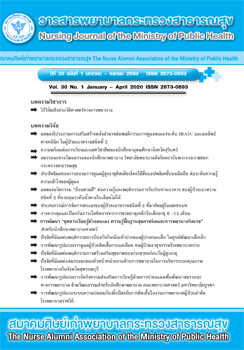Effects of an Empowerment Program on Selfcare Behaviors, HbA1C and Clinical Outcomes in Uncontrolled Type 2 Diabetes Patients
Main Article Content
Abstract
The purpose of this quasi-experimental, one group Pretest-Posttest research design was aimed to studying the effects of an empowerment program on selfcare behaviors, HbA1C, and clinical outcomes among uncontrolled type 2 diabetes patients in one health promoting hospital in Nakhon Si Thammarat province.The sample of 35 uncontrolled type 2 diabetes patients received the empowerment program for 16 weeks. The research instruments included 1) the empowerment program based on the Gibson’s model and 2) a questionnaire of selfcare behaviors. The content validity index of the questionnaire was .82 and Cronbach’s alpha coefficient was .70. Data were analyzed using frequency, percentage, mean, and standard deviation. A paired t-test was used to compare pre-test and post-test scores. The results showed that after implementing the program, the sample had significantly a higher mean self-care behavior score, while the mean score of HbA1C, systolic blood pressure, BMI, and blood sugar decreased significantly after completing the program at the .05 level. The findings suggest that the empowerment program was useful for promoting the selfcare behaviors among uncontrolled diabetic patients in a primary care unit.
Article Details
บทความและรายงานวิจัยในวารสารพยาบาลกระทรวงสาธารณสุข เป็นความคิดเห็นของ ผู้เขียน มิใช่ของคณะผู้จัดทำ และมิใช่ความรับผิดชอบของสมาคมศิษย์เก่าพยาบาลกระทรวงสาธารณสุข ซึ่งสามารถนำไปอ้างอิงได้
References
2. Aekplakorn W. The 5th Thai people health examination survey report 2014-5. Nonthaburi: The Graffico system; 2015. (in Thai)
3. Nakhon Si Thammarat Public Health Office. Data of diabetes mellitus type2 patient in Nakhon Si Thammarat province; 2016.
4. American Diabetes Association. Standards of medical care in diabetes. Diabetes Care. 2017;40(Suppl1):S64-S74.
5. American Diabetes Association. Cardiovascular disease and risk management. Diabetes Care 2017;40:S75–S87.
6. International Diabetes Federation, Clinical Guidelines Task Force. Global guideline for type2 diabetes. Education. 2012;21-6.
7. Gibson CH. A concept analysis of empowerment. Journal of Advance Nursing.1991;16:354-61.
8. Rodjarkpai Y, Kittilernkrait S, Kamonpornmongkol P. Effect of empowering program for self-protection behavior in people at risk of diabetes Nong Yai district, Chonburi Province. The Public Health Journal of Burapha University. 2012;7(2):116-23.
9. Sukpitak Y. Empowerment technique for self-management of diabetes patients in accordance with the community life style. Journal of Health Science. 2014;23(4):649-58 (in Thai)
10. Sriklo M, Khungtumneam K, Buajaroen H. Effects of footcare promoting program on perceived empowerment and footcare behaviors. Journal of Boromarajonani College of Nursing. 2014;30(2):68-79. (in Thai)
11. Boonchun N, Ucharattana P, Punsakd W, Meehardsai N. Effects of an empowerment program on self-care agency for elders with hypertension. Journal Nursing Science. 2011;29:93-102. (in Thai)
12. Faul F, lder EE, Lang A-G, Buchner A. G*Power 3: A flexible statistical power analysis program for the social, behavioral, and biomedical sciences. Behavior Research Methods. 2007;39(2):175-91.
13. Chen M-F, Wang R-H, Lin K-C, Hsu H-Y, Chen S-W. Efficacy of an empowerment program for Taiwanese patients with type 2 diabetes: A randomized controlled trial. Appl Nurs Res. 2015;28:366–73.
14. Wong CKH, Wong WCW, Lam CLK, Wan YF, Wong WHT, Chung KL, et al. Effects of patient empowerment program (PEP) on clinical outcomes and health service utilization in type 2 diabetes mellitus in primary care: an observational matched cohort study. PLoS ONE. 2014;9(5):e95328.
15. Khattab M, Khader YS, Al-Khawaldeh A, Ajlouni K. Factors associated with poor glycemic control among patients with type 2 diabetes. J Diabetes Complications. 2010;24:84-9.
16. Kanglee K. Factors associated with glycemic control among people with type 2 diabetes mellitus at Phramongkutklao Hospital, Bangkok. Journal of The Royal Thai Army Nurses. 2014;15:256-68. (in Thai)

